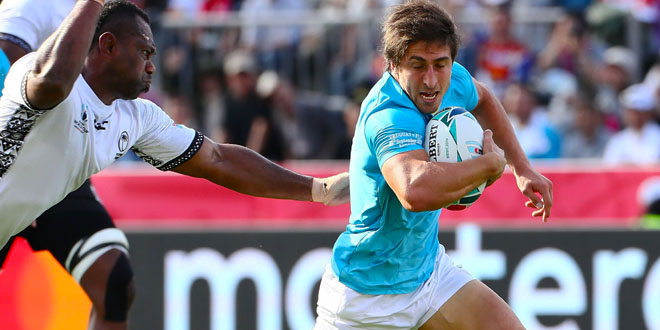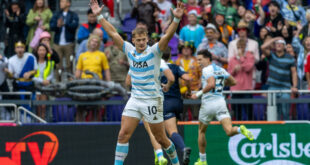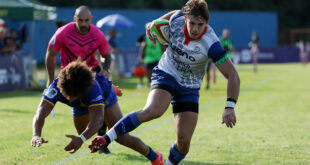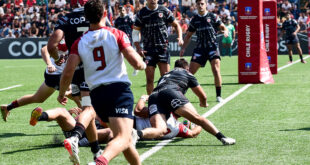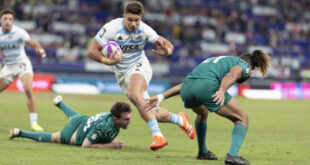RWC 2019 saw the top four from the Americas competing against the very best. No teams made the knock-out stages though there were moments of excellence both in terms of collectivity and individual brilliance.
All players from all four countries were considered. Ultimately the strong campaign of Uruguay has converted into Los Teros having the highest representation of all and, an overall majority.
ARN believes that the regional powerhouses, Argentina selected poorly for the tournament. The coaching staff’s decision to play Matías Moroni and Javier Ortega Desio out of position and to leave out Gonzalo Bertranou out of the initial roster were all misconceived. Facundo Isa’s absence was incredibly ill-conceived.
Canada played three matches only. The cancellation of their game against Namibia means that the players had reduced match time and also that their one winnable fixture never happened. This explains in part Canada’s non-representation in the RWC 2019 Americas Dream Team. The other factor is that Canada’s best players were not as good as Uruguay’s in the corresponding positions.
The USA were winless but upon careful analysis the team actually did very well against both England, and France. ARN estimates that a comparable fixture from a past RWC would have converted into 60 point defeats. Furthermore, Gary Gold’s decision to not rest players against Argentina was the prime reason for defeat against Tonga.
RWC 2019 ARN BEST OF THE BEST
Back: Felipe Berchesi (Uruguay)
Forward: Guido Petti (Argentina)
MVP: Santiago Arata (Uruguay)
RWC 2019 ARN AMERICAS DREAM TEAM
1 – Nahuel Tetaz Chaparro (Argentina) Argentina used Tetaz Chaparro a lot as a ball-carrier. While he did not gain a lot of meters he put in a heavy workload. The additional factor for his inclusion is that the scrum was solid.
2 – Joe Taufete’e (USA) Julián Montoya and Germán Kessler were both excellent and both scored tries. Yet the leading carrier was Taufete’e with 37. He also played 244 minutes and ranked very highly for both his tackle completion and turnovers won.
3 -Diego Arbelo (Uruguay) The leading tight head was Diego Arbelo, a busy performer across all areas for Los Teros. He held his own against excellent opposition, always pushing himself to show he was up to the challenge. It was not only his work around the park but also in the scrum where he impressed.
4 – Guido Petti (Argentina) The best forward from the Americas was Guido Petti. His numbers were truly phenomenal with him being the undisputed best second-rower at RWC 2019. As a ball carrier he made 70 meters; in the lineout he outperformed everyone in stealing 5 of the opposition’s throws; and he also excelled both in defenders beaten and in turn-overs won.
5 – Manuel Leindekar (Uruguay) An excellent campaign saw Manuel Leindekar putting in solid performances. He started in all matches, including playing the full 80 minutes against Fiji and Georgia – two matches in five days. Nick Civetta was the next best performer.
6 – Juan Manuel Gaminara (Uruguay) Lucas Rumball was solid for Canada though the leading player was the Uruguayan captain. Gaminara went through a mountain of work with 52 tackles and he also carried surprisingly well for a player of his size playing flanker.
7 – Marcos Kremer (Argentina) A second-rower converted to flanker for Los Jaguares and then Los Pumas, both by Mario Ledesma. His tackling statistics underline why him playing flanker makes sense. Yet for 2020 expect to see him locking the scrum. Also impressing in the position was Canada’s Matt Heaton who was very good aside from his knock-on which cost a certain try.
8 – Manuel Diana (Uruguay) With tries against Fiji, and Australia Manuel Diana was a stand-out performer. He also tackled well and carried well to now be Uruguay’s starting No8 ahead of Alejandro Nieto. Tyler Ardron and Cam Dolan had their moments but neither played as well as Diana.
9 – Santiago Arata (Uruguay) The statistics for Santiago Arata confirm ARN’s analysis that he is the best scrum-half from the Americas. He won six turn-overs, defeated 6 tacklers, made 38 tackles of his own and box-kicked over 50 meters on numerous occasions. Ruben de Haas was excellent against Argentina and Tonga.
10 – Felipe Berchesi (Uruguay) With 30 points in the tournament Felipe Berchesi was the second highest point scorer of the pool stage. He also ran well in every match, totally 119 meters. Benjamín Urdapilleta was next best. He kicked 100% of his goals.
11 – Santiago Carreras (Argentina) With 7 linebreaks Santiago Carreras finished second to Juan Cruz Mallía. Carreras took over from Ramiro Moyano and made the shirt his own. His allusive running made him one of the breakout players for Los Pumas.
12 – Andrés Vilaseca (Uruguay) Mr reliable in the mid-field was Andrés Vilaseca. In addition to being a try scorer he also outperformed the well-respected Haleigh Parkes. He was very busy overall in completing 41 tackles and 2 clean line breaks.
13 – Juan Cruz Mallía (Argentina) Just one match but it was the best of the tournament by any player in his position. In his RWC debut Mallía made six clear line breaks, scored two tries, and assisted in three others. A dominant display following three lackluster games from Matías Orlando. Juan Manuel Cat was the next best outside center.
14 – Blaine Scully (USA) The only starting winger to score twice in the tournament was Captain America. He also made three clean line breaks one less than Uruguay’s leading player in this area, Nicolás Freitas. Bautista Delguy was excellent but had limited game time with Matías Moroni playing poorly yet starting in three matches in the position.
15 – Gastón Mieres (Uruguay) With a crucial try assist against Fiji Gastón Mieres put in the crucial performance from any fullback from the Americas. Yet his performances were also noteworthy in other areas such as 79 meters made. Mike Te’o was hit-and-miss for the Eagles while Emiliano Boffelli was let down by his teammates.
 Americas Rugby News Rugby news from across the Americas!
Americas Rugby News Rugby news from across the Americas!
